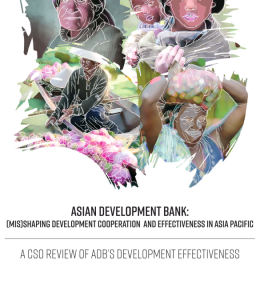Having mobilized immense resources for and intervened significantly in most aspects of its developing member countries’ (DMCs) economies and policies, the Asian Development Bank (ADB)has been purported to be the region’s leading development financial institution for poverty eradication. In its recent public perception survey, it takes pride for being perceived as an institution that “continues to have a positive impact on the lives of the poor in the Asia and Pacific region” as it “helps countries meet their development goals…”
At the end of the day, however, the ultimate measure of its effectiveness in bringing about development will be its impact on people and the planet. While claiming that poverty reduction hascontinued, ADB itself acknowledges in its 2017 Development Effectiveness Review that “326 million of the region’s people still lived below the extreme poverty line…and nearly 1 billion others were positioned only slightly above it. Inequality declined slightly in some ADB DMCs, but the gap between rich and poor remains substantial.”
And what speaks more than these figures is the actual living conditions of people and the state of the environment – people living primitively in the hinterlands or cramped in indescribably blighted slums slowly dying of starvation, illnesses, disasters, conflicts, and so on. There is no doubt that the ADB has aligned its policies, strategies, and operations with the principles of effective development cooperation – but only to some extent compatible within itsmandates, the set of interventions and objectives outlines in its corporate strategy and the reigning interests of corporations and its governing board. Without taking human rights fully into account, development interventions will only be effective in so far as its own parameters and measures are concerned with little bearing on the region’s poor.
As such, in reclaiming their rightful position at the heart of the development process, the people and their organizations, as well as development workers at large, need to be equipped with tools that clearly narrate their situation, positions, and alternatives. This book is one of the many knowledge products that The Reality of Aid – Asia Pacific generates to support civil society organizations (CSOs), policymakers, academics, media and other stakeholders in their development work; one of the many that the network will be producing to ensure that people’s voices are well-documented, widely propagated, and effectively used in policy advocacy, development work, and mass campaigns towards greater push for reforms and understanding and shedding light on the real development agenda.

